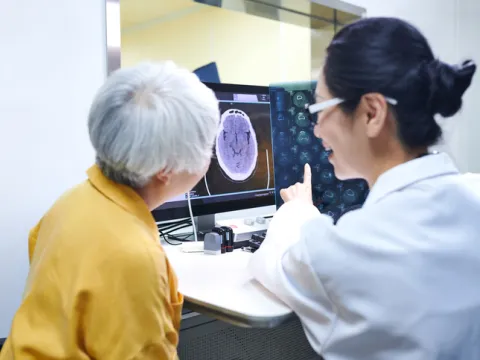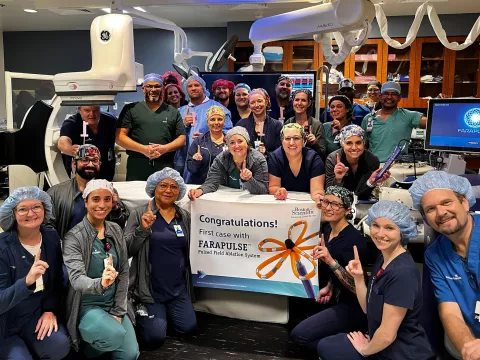- AdventHealth
While lung cancer is the leading cause of cancer deaths, when diagnosed at stage 1, the 5-year survival rate is 62.8% compared to the overall lung cancer 5-year survival rate of 25.4%. However, only 20.7% of lung cancers are diagnosed at the early or localized stage despite increased screening efforts in recent years. To help improve early detection, AdventHealth Orlando recently secured the Ion™ endoluminal system, a robotic-assisted platform for minimally invasive biopsy of the lung. AdventHealth Heart, Lung & Vascular Institute (HLVI) pulmonologist Jonathan Schroeder, DO, performed the hospital’s first two robotic bronchoscopy procedures using this new technology on November 17, 2023, and he will perform the first procedure at AdventHealth Waterman in Taveres in March 2024.

Approved by the U.S. Food and Drug Administration (FDA) in 2019, the Ion system uses a shape-sensing bronchoscope that aids physicians in obtaining tissue samples for biopsy of peripheral tumors from deeper within the lung more accurately compared to conventional electromagnetic navigation bronchoscopes. As a result, this new robotic platform may help patients avoid subsequent, more invasive CT-guided biopsies and the complications they can cause, including pneumothorax (collapsed lung) and pulmonary hemorrhage.
Achieving Safer, More Precise Lung Cancer Diagnosis
Conventional electromagnetic navigation bronchoscopy and other bronchoscopic modalities only have a diagnostic yield (lung cancer detection rate) of about 60–70%, and CT-guided biopsy typically achieves around 82%. By contrast, a recently published single-center study of the Ion robotic bronchoscopy system used in conjunction with advanced fluoroscopic imaging demonstrated a higher diagnostic yield of 92.2% for all lesions and 89.3% for lesions 10 mm or less.
Additionally, a recent meta-analysis found robotic-assisted bronchoscopy resulted in significantly lower overall complication rates of 2.3% for pneumothorax and 0.5% for pulmonary hemorrhage. In comparison, a separate meta-analysis of complication rates for CT-guided biopsy concluded a 25.3% rate of pneumothorax and an 18% rate of pulmonary hemorrhage.
“Robotic bronchoscopy has supplanted CT-guided biopsy as a safer and more effective first step in diagnosing the vast majority of lung nodules,” comments Dr. Schroeder.
How the Robotic Bronchoscopy with the Ion System Works
With the patient under general anesthesia, the physician uses a controller to navigate a catheter to the target along a planned path. The catheter can articulate 180° in any direction to pass through small, difficult-to-navigate airways and around tight bends to reach all 18 segments of the lung. A peripheral vision probe provides direct vision during navigation, and once the pulmonary nodule is reached, the catheter locks in place. A flexible biopsy needle then passes through the catheter and deploys into the target location with a pathologist in the room during the procedure to ensure diagnostic sample is obtained. The Ion system also allows for completion of biopsies of multiple bilateral targets if needed. Furthermore, mediastinal staging is completed during the procedure, saving the patient a repeat procedure to complete the work up.

“With robotic bronchoscopy along with our augmented imaging, we are able to biopsy even smaller lesions with greater confidence and in locations that previously were not amenable via traditional bronchoscopy,” explains AdventHealth HLVI pulmonologist Katrina Abril, MD, MSc, who also uses the new Ion system. “Overall, this contributes to the prompt diagnosis of cancer at its early stage."
AdventHealth remains committed to investing in new technologies like the Ion robotic bronchoscopy system that enhance patient care and outcomes. Within Florida, the Ion technology is available at AdventHealth Daytona Beach, AdventHealth Orlando, AdventHealth Waterman and AdventHealth Wesley Chapel.
Recent News
In a new article published in the medical journal Age and Ageing, AdventHealth Research Institute’s Dr. Audrey Collins shares the results of a recent study evaluating the impact of exercise on...
Accurately determining food intake remains a challenge in nutrition research. A new study published in Nature Metabolism and co-authored by Dr. Corbin introduces a metagenomics-powered approach to...
Discover what’s being accomplished in Central Florida to bridge the health gap with Orange County Mayor Jerry Demings and AdventHealth’s Dr. Alric Simmonds.
Breakthrough device offers new hope for stroke survivors struggling with rehabilitation following ischemic stroke
Jennifer Seminerio, MD, recently became one of the first in Florida to use intestinal ultrasound (IUS) to help assess and manage treatment of patients with inflammatory bowel disease (IBD). A non...
Physician leaders from AdventHealth’s emergency department, infectious disease, inpatient, pediatrics and pharmacy teams all collaborated to develop a respiratory virus testing algorithm to assist...
Thoracic surgeon Colleen Gaughan, MD, and her team at AdventHealth Celebration, recently became one of the first in the country to incorporate targeted imaging agent Cytalux (pafolacianine) as part of...
On the newest Inspiring Wholeness podcast, Obie Diaz, local morning radio show host, shares how a routine physical eventually led to two open heart surgeries.
AdventHealth recently began piloting a new Genomics Risk Assessment for Cancer and Early Detection (GRACE) program that combines the use of digital mammography, artificial intelligence (AI) technology...
AdventHealth Clinical Research Unit (CRU) Executive Director and Medical Director of Genitourinary Oncology Guru Sonpavde, MD, co-authored an article on the AMBASSADOR Phase III clinical trial results...
A promising new treatment for AFib patients called Pulse Field Ablation is first offered in Central Florida at AdventHealth and shows less damage to tissue.
Plastic and Reconstructive Microsurgeon Sabrina Pavri, MD, and Breast Surgeon Devina McCray, MD, recently began offering immediate neurotization after breast reconstruction, a new surgical technique...












